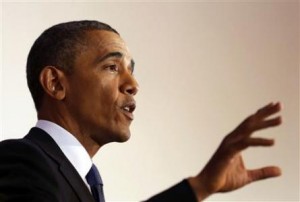 World reaction was swift following President Obama’s decision to seek Congressional approval for military action against Bashar al-Assad’s regime, with Syrian officials characterizing it as saving face, Europeans expressing cautious support and the pope calling for a day of prayer.
World reaction was swift following President Obama’s decision to seek Congressional approval for military action against Bashar al-Assad’s regime, with Syrian officials characterizing it as saving face, Europeans expressing cautious support and the pope calling for a day of prayer.
“(British Prime Minister David Cameron and President Obama) climbed to the top of the tree and banged their drums for action and now they don’t know how to get down — (seeking legislative approval for action) allows them this,” Syrian U.N. representative Bashar al Jaafari told Sana state TV on Sunday.
While Germany and Italy called for military action only if the U.N. Security Council passes a resolution authorizing such an attack — which is unlikely because of Russian opposition — France said it’s prime minister, cabinet members and leading lawmakers would meet Monday ahead of a parliamentary debate Wednesday on airstrikes.
Britain’s parliament voted against military action in Syria last week. On Sunday, Cameron gave a nod to Obama’s decision, tweeting “I support and understand Barack Obama’s position.”
France’s President Francois Holland has been leading the call for action against the Syrian regime even as two-thirds of the French oppose the country’s involvement, according to a poll published by Le Parisien newspaper over the weekend.
“France cannot go alone — there has to be a coalition in place,” Interior Minister Manuel Valls told France’s Europe Radio 1.
Political analyst Nicole Bacharan told the broadcaster that the U.S., like France, is in a tricky position.
“Obama is really alone in the world — there is no international mandate, no U.N. mandate or NATO, there is no coalition,” she said. “There is no national mandate either.”
Some say world leaders’ caution, especially in the U.K. and the U.S. arises from a public wariness over another quagmire such as Iraq, which some believe was started after faulty intelligence regarding weapons of mass destruction. France opposed involvement in that war.
“What Barack Obama has done is consistent with our set of decisions, which is that you have to take the country with you,” Britain’s Chancellor George Osborne told the BBC. “Barack Obama is also a post-Iraq politician and he is living with the legacy of the way decisions were made in his country 10 years ago (just as we do). David Cameron and Barack Obama are leaders trying to learn from that experience and trying to take people with them.”
Meanwhile, Pope Francis on Sunday called for a day of prayer Saturday for Syria. “My heart is profoundly wounded these days by what is happening in Syria,” he told worshipers at the Vatican on Sunday.
The pope said he was worried over the mounting pressure for an attack against the Syrian regime. “I strongly condemn the use of chemical weapons,” he said. “But more violence does not lead to peace but just more war.”
MIDDLE EAST REACTION
In Antakya, about 25 miles from the Syrian border, some have been protesting against military intervention in Syria over the past few weeks.
“The local people just want to make their voices heard in these demonstrations,” said Nour Maraawi, a Syrian living in Antakya. “As long as you don’t openly announce that you’re anti-regime, I think it will all be fine. I tell them that I’m in the gray area and against all the killing.”
Turkey, which shares a porous border with Syria, has seen the Syrian conflict spill over into the country. In May, a double car bombing in the border town of Reyhanli killed more than 50 people. Turkish Prime Minister Recep Tayyip Erdogan, who has called for the Syrian regime to step down over the past two years of the conflict, blamed Turks loyal to the Syrian regime.
Still, there is fear of local tensions escalating if Turkey were to be involved in any military strikes on Syria.
“We don’t like the Syrians living in Antakya — we can’t be as relaxed or feel as safe as in the past, and it doesn’t feel like our hometown anymore,” said Yasemin Hussein, a student from Antakya. “There will be chaos in Antakya if there are strikes because the Syrians living here don’t like the regime, and Antakyans support it.”
Meanwhile, Egypt condemned the use of chemical weapons in Syria last week and called on the international community to hold the responsible party accountable, but the nation also vowed not to participate in a possible strike against Syria.
Egyptian Foreign Minister Nabil Fahmy said Thursday that the country opposes any military action against Syria and would not support American-led strikes in response to alleged chemical weapons use.
If the U.S. and its allies were to strike, “the government reaction would be limited to issuing a statement criticizing this military intervention (and) disapproving of the military action,” said Mustapha Al Sayyid, a professor of political science at Cairo University and the American University in Cairo.
Mohamed Kadry Said, a retired general and head of the security studies unit at the Al-Ahram Center for Political and Strategic Studies in Cairo said Egyptians would oppose American-led strikes in Syria.
“Forget the government,” he said. “I expect people in the street will not be happy with this, especially because the war itself is not clear. … I cannot believe that this will go well in the region.”
USA Today

Leave a Reply
You must be logged in to post a comment.